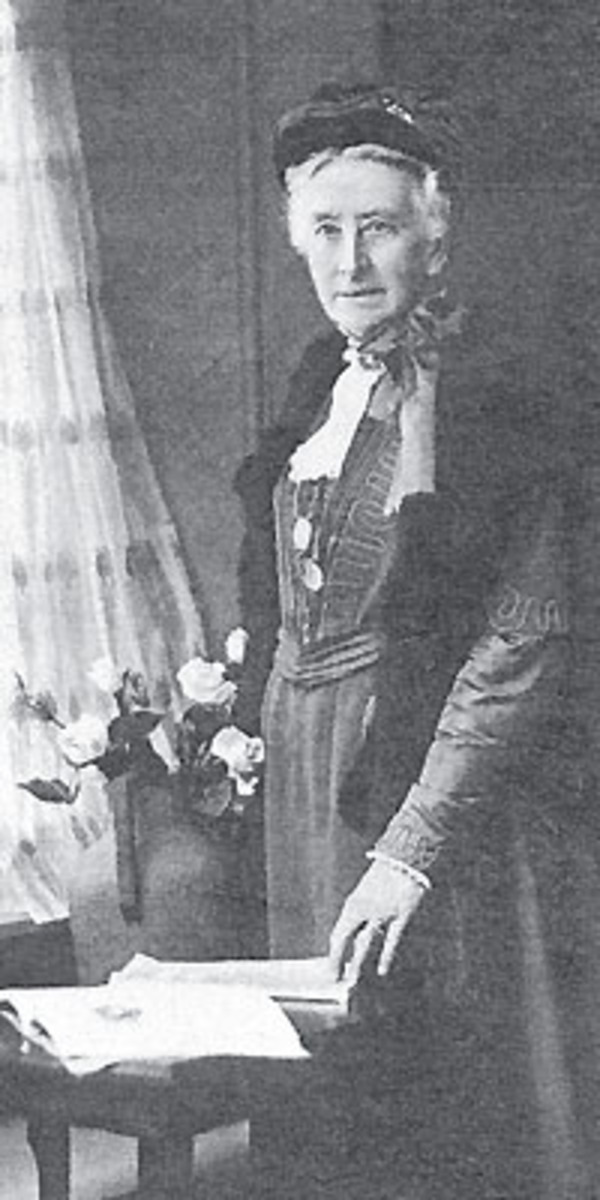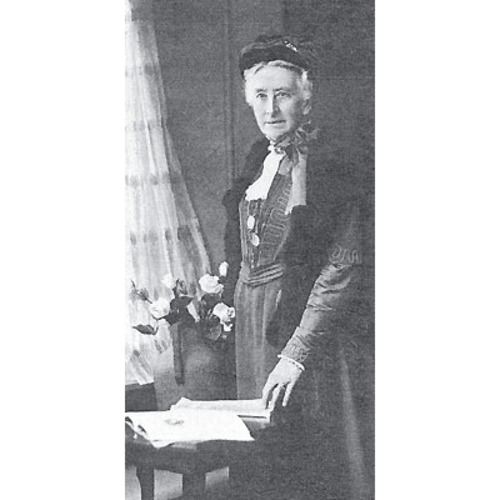
Source: Link
ODELL, ROBERTA ELIZABETH (Tilton), social reformer; b. 20 Sept. 1837 in Whiting, Maine, daughter of Daniel Ingalls Odell and Hannah Elizabeth Peavey; m. 11 Nov. 1858, in Eastport, Maine, John Tilton of Saint John; d. 28 May 1925 in Ottawa and was buried 1 June in Beechwood Cemetery.
Roberta E. Tilton was an imposing figure of high Victorian Ottawa society. Tall, attractive, and energetic, she was a convincing writer and impressive public speaker in championing women’s public role in society, and she helped to forge an enduring female culture through her work in several women’s organizations.
She arrived in Ottawa in January 1868, her husband having abandoned his commercial business at Saint John in order to join the federal civil service. Her first known public involvement came in 1878, when she was elected first vice-president of the Ontario Woman’s Christian Temperance Union. Three years later she became a founding member of the Ottawa WCTU; she was made president of this body and chair of its Sunday school department, both by acclamation. Devoted to the eradication of alcohol, tobacco, and violence against women and children, the WCTU quickly added to its mission the correction of a host of other social ills. Chief among its goals were the protection of the Christian family unit, the inculcation of a sense of personal and social responsibility in youth through education, and resistance to the hedonism associated with rampant commercialism and secularism.
Tilton was in the forefront of the movement. One of the public projects she promoted in this early period was the establishment of a coffee house in the By Ward Market, where alcoholic refreshments were distressingly bountiful. Even though her husband dismissed the plan as naive, she and her colleagues pushed the initiative through without any help from the WCTU’s male advisers. “The ladies had but one mind and one object,” she wrote, “to win souls.” “Our minds had been fixed on the Master and his love, our object to win souls for Him.” Raised in a Unitarian family, Tilton had joined the Church of England at the time of her marriage and her faith was grounded in Anglican evangelicalism. A true believer, she maintained, could aid in another’s salvation by forcing a reckoning with sins committed and by creating the means to shun sin in the future.
Like other prominent local and provincial WCTU members, Tilton also served her organization at the dominion level, as superintendent of sabbath observance (1889), treasurer (1892–95), superintendent of soldiers and volunteer camps/militia (1895–97), and official auditor (1898–1901). She had introduced a department of narcotics to the provincial body in 1890 and served as its superintendent until 1891; in 1890 as well she was an Ontario delegate to the annual convention of the Dominion WCTU.
Tilton was also the main founder of the Woman’s Auxiliary to the Missionary Society of the Church of England in Canada. She presented her proposal for the new body in April 1885 as the head of a seven-woman delegation to the management board of the church’s Domestic and Foreign Missionary Society. In her words, “There are in the Church to-day Marys who have chosen the better part; there are the restless serving Marthas, who only want the opportunity to do something for Jesus; the Magdalens, who tell the story of our blessed Lord’s resurrection; the Phoebes, who convey messages of love and Christian greeting; the Tryphenas, and Tryphosas, Dorcases, who are never weary in well doing . . . yes, in the Church of Canada – from Victoria to Sydney – there are women longing to labor more abundantly, to consecrate all their talents to the Lord’s work.” The board enthusiastically accepted the offer. Tilton was invited to be secretary of the auxiliary in the diocese of Ontario, the first branch to be established [see John Travers Lewis*]. She became corresponding secretary of the WA at the ecclesiastical provincial level when it was formed in 1886, and in 1891 was elected its president, a post she would occupy for a decade. Between 1902 and 1908 she served as president of the dominion auxiliary. Throughout this period she remained active in her diocesan body, where she accepted a number of executive roles. Under Tilton’s leadership the WA supported a variety of causes but gradually came to specialize in support of missions and “lady missionaries” and especially in funding the education of missionaries’ children who lived far from schools. It became the largest women’s association within the Church of England in Canada – at her death it numbered around 70,000 in 3,000 branches – and remains the church’s oldest continuous national organization.
When Tilton retired from the executive of the dominion WA in 1908, she was presented with a sizeable cash gift by the grateful organization. She decided to donate the money to support aged women missionaries. The Ottawa diocesan auxiliary, of which she had been a member since the diocese was formed in 1896, further honoured her after her death by the purchase in 1925 of a memorial house in her name as its headquarters. These marks of respect were bestowed in the full knowledge that Tilton had been instrumental in redefining the role of Anglican women. Formerly seen as adjuncts and helpmates in church activities defined for them, women through the auxiliary that Tilton had initiated insisted on their right to identify projects of special significance to other women and to find funding for those projects within their own membership.
Other Anglican women’s organizations received the benefit of Tilton’s leadership. In April 1889 she had reorganized the Ottawa branch of the Girls’ Friendly Society in Canada. Ready and able to use the same strategies she had pioneered in creating, with the WA, a diocesan and ultimately a national organization of older women, she was eager to recreate a structure in which mature Christian women would mentor their younger sisters. Her leadership of the diocesan GFS demonstrates the interlocking nature of women’s organizations which so characterized the period. For example, the GFS worked with several organizations in outfitting a room in the Children’s Hospital and in providing volunteers and financial aid for the interdenominational mission in Anglesea Square. Its members worked with the Local Council of Women on various projects and benefited from speakers sent by the Young Women’s Christian Association, where the director was a friend of Tilton’s. Through her involvement with the Anglican diocesan Mothers’ Union and Girls’ Auxiliary, Tilton further strengthened networks of Christian women. Beyond the church, she was one of the founders of the National Council of Women of Canada, where she was to take a special interest in immigration; at the request of Lady Aberdeen [Marjoribanks*] she represented the GFS at the council’s organizing meeting. She sat as well on the executive of the Local Council and of the Orphans’ Home of the City of Ottawa, with its Refuge Branch for aged women.
Tilton’s husband, John, who had risen to become a deputy minister and had served as commander of the Governor General’s Foot Guards, predeceased her in 1914. At some point they had adopted a son, baptized Silas, who had died before reaching manhood. In her journal for 1912 Tilton marked his birthday, noting that, had he been spared, “he would have been married and had children probably & that would have been a great pleasure to us all.” “But,” she added, “I do not doubt that God did what was best.” After a full and dutiful life, she herself died in May 1925. She had earned the commendation to which the WA as a whole aspired: “She hath done what she could, not what she would like to do, nor what others thought she ought to do, but what she could.” Her life of service is commemorated by the Anglican Church of Canada on 30 May.
ACC, Diocese of Ottawa Arch., Girls’ Friendly Soc. and Ottawa Diocesan Council, minute-book, 1894; General Synod Arch. (Toronto), GS 76-15 (Woman’s Auxiliary papers), R. E. Tilton, journals. AO, F 885, MU 8397–98, 8406–7, 8425.10; RG 80-8-0-988, no.9405. NA, RG 31, C1, 1901, Ottawa, B, 4: 23, no.39 (mfm. at AO). Ottawa Citizen, 29 May 1925. Church of England in Canada, Board of Domestic and Foreign Missions, Woman’s Auxiliary, Letter leaflet (Toronto), November 1896. S. A. Cook, “To ‘bear the burdens of others profitably’: the changing role of women in the diocese of Ottawa, 1896–1996,” in Anglicanism in the Ottawa valley, ed. F. A. Peake (Ottawa, 1997), 129–53. Mrs Willoughby Cummings [E. A. McC. Shortt], Our story: some pages from the history of the Woman’s Auxiliary to the Missionary Society of the Church of England in Canada, 1885 to 1929 (Toronto, [1929?]). Key Eliot, “History of the Woman’s Auxiliary in Carleton deanery” (typescript, Ottawa, 1957; copy in ACC, Diocese of Ottawa Arch.). National Council of Women of Canada, Year book (Ottawa; Toronto). Vital statistics from N.B. newspapers (Johnson), 17, no.864. [L. C. W.], Sketch of the life and work of Roberta E. Tilton, by one of her first W.A. members ([Ottawa?], n.d.).
Cite This Article
Sharon Anne Cook, “ODELL, ROBERTA ELIZABETH (Tilton),” in Dictionary of Canadian Biography, vol. 15, University of Toronto/Université Laval, 2003–, accessed January 1, 2026, https://www.biographi.ca/en/bio/odell_roberta_elizabeth_15E.html.
The citation above shows the format for footnotes and endnotes according to the Chicago manual of style (16th edition). Information to be used in other citation formats:
| Permalink: | https://www.biographi.ca/en/bio/odell_roberta_elizabeth_15E.html |
| Author of Article: | Sharon Anne Cook |
| Title of Article: | ODELL, ROBERTA ELIZABETH (Tilton) |
| Publication Name: | Dictionary of Canadian Biography, vol. 15 |
| Publisher: | University of Toronto/Université Laval |
| Year of publication: | 2005 |
| Year of revision: | 2005 |
| Access Date: | January 1, 2026 |



